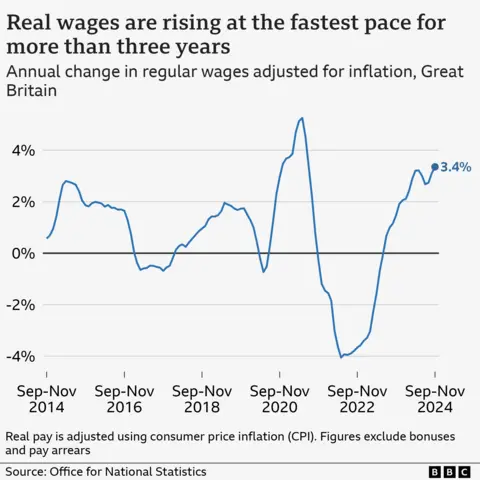Pay after inflation rises at fastest rate since 2021
 Getty Images
Getty ImagesUK pay after inflation has risen at its fastest rate for more than three years, driven by strong wage growth in the private sector.
Pay packets increased on average by 3.4% between September and November compared with the same period a year ago after taking into account the impact of price rises, according to the Office for National Statistics (ONS).
Growth in private sector earnings was stronger than for public sector jobs.
Despite a risk of higher wages pushing up inflation, the Bank of England is still expected to cut interest rates next month.
Rates are currently at 4.75%, but traders have bet on a cut to 4.5% in February, after inflation, which measures the rate prices rise at over time, unexpectedly fell last month.
The Bank of England watches the pay and jobs data closely when making decisions on interest rates. The latest ONS figures estimated that average weekly earnings in the UK hit £660 in November, when inflation was 2.6% - the latest figure is 2.5%.
"Pay hasn't put this much clear blue water between itself and inflation for around three and a half years, so the difference is palpable. It's leaving us with more money at the end of the month," said Sarah Coles, head of personal finance at Hargreaves Lansdown.
Ms Coles warned there was a risk rising wages could lead to higher inflation and interest rate cuts being delayed, but added "on balance, the lack of growth in the economy, and a month of falling inflation, are likely to mean a rate cut in February is still on the cards".
Ashley Webb, UK economist at Capital Economics, added some of the Bank's policymakers "may be worried" by the resurgence in private sector pay growth, but said he suspected most of them would look at signs that the labour market was "loosening", and cut rates.
The UK's unemployment rate was estimated to have ticked up to 4.4%, while the estimated number of vacancies dropped 2.9% to 812,000 from October to December, continuing the decline but still remaining above pre-Covid pandemic levels.
The ONS advised treating its jobs market figures with "caution", due to questions over the relatability of the data caused by low response rates to its survey.

Petra Tagg, director at recruitment firm Manpower UK, told the BBC's Today programme that organisations had been "offering high rates of pay" as they looked for employees with specific skills for jobs in engineering, IT, and artificial intelligence.
But she said workers were "less likely to be moving [companies] as people are more nervous to look for employment in these… quite concerning times".
Economists at Pantheon Macroeconomics said employment dropped in December as "firms put hiring on hold" following tax rises announced on businesses in the Budget.
Chancellor Rachel Reeves, who has been under pressure following figures showing the UK economy has flatlined, decided that firms should bare the brunt of £40bn worth of tax rises, with hikes in the National Insurance rate and a reduction to the threshold for employers.
Businesses have repeatedly warned the extra costs, along with minimum wages rising and business rates relief being reduced, could impact the economy's ability to grow, with employers expecting to have less cash to give pay rises and create new jobs.
But Rob Wood, chief UK economist at Pantheon, added: "There is little sign from jobless claims and redundancies of a sharp labour market downturn. The labour market is loosening, but only gradually."
Ms Coles said the "good news on wages" could be short-lived going further into the year as there was a "risk" that businesses facing higher costs "will cut back on both staff and wage rises".
The UK has had worker shortages for various sectors in recent years. This can drag on economic growth, but can also lead to workers in those industries securing higher pay deals as employers seek to attract them or current bosses try to retain them.
But inflation can follow when consumer spending increases as a result of people having more disposable income, pushing up demand for goods and leading to prices in the shops rising.
Regular pay increased by an annual average of 5.6% between September and November, compared with the same period the year before, but when taking into account inflation, the real wage increase was 3.4%.
Work and Pensions Secretary Liz Kendall said the jobs market and wage figures were "more evidence" that the UK had to boost employment.
She added the government was "working to boost living standards and get the economy growing", but reforming Jobcentres and "guaranteeing every young person has the chance to be earning or learning".
